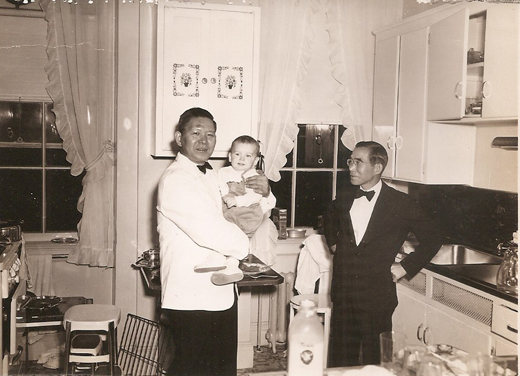
Let’s just never mind why. The oven smoked something awful tonight. I knew that it was going to, but I had to run a few pieces of ham under the broiler, for a total of ten minutes. In that short time, the air in the kitchen became toxic. It would have been less so if I hadn’t closed the swinging door, but on a hot night I didn’t want to open the balcony door. And I certainly didn’t want to advertise my smoke-detectorlessness to my neighbors, by opening the front door, which is what Kathleen wanted to do. When we sat down to dinner — a very tasty dinner, as it happened — I weakened and let in the hot air from outside.
Why am I telling you this? Because I want you to know that even on days when I don’t cross a street, life can be very exciting here. And, even though the smoke has cleared, the air in the kitchen is still pretty acrid.
Notwithstanding all of that, as I say, we had a very nice dinner, and I want to thank Kathleen’s cousin-by-marriage, Kurt Holm, for the recipe. Kurt and a friend of his have started up a very smart site — I suppose it’s a blog, essentially — that offers a dandy idea for dinner every weekday. The idea, I believe, is that you check out the site while you’re at work, and, if you like what’s on offer that day, you print out the entry, which includes a shopping list, a pantry list — things that you’ve probably got on hand — and a list of necessary kitchen equipment, as well as step-by-step instructions. It couldn’t be more lucid. This was the second time that we tried a recipe.
The site is called notakeout, and today’s dish is called “Green Beans, Walnuts and Lemon with Grilled Ham.”
To tell you the truth, I have never had anything quite like it — and yet there’s nothing strange about the food in front of you. Atop slices of ham that have been glazed with melted apricot preserves and then grilled, you spoon a light salad of steamed beans tossed in butter and lemon, together with a handful of toasted chopped walnuts. Kathleen, who would eat cardboard if you squeezed lemon juice on it, was in heaven, and ate every bite. I ate every bite, too. I made a few very slight and very idiosyncratic mental adjustments to the recipe, because there will be a next time.
After dinner, I retired to the blue room and did a lot of tedious updating work on the “Home Theatre” branch at Portico. (The menu has no permalink, so I’ll send you to the page with the sexy snaps — can you believe Claudette Colbert’s dress? If she were buck naked, you wouldn’t stare as hard.) Over the years — and I mean all of them, since 2000, when I launched Portico, that I’ve spent online — I’ve occasionally written up movies in my DVD collection. This is distinct from the “Friday movies,” reports of movies that I’ve just seen in the theatre.
Why would I write about a film twice? The simplest answer is to invite you to compare the review that I gave to Hollywoodland when I saw it in the theatre, nearly three years ago — in those days, I kept the reviews at The Daily Blague, not at Portico — and the Home Theatre entry that I wrote today, after watching the DVD three times over a recent ten-day period. Studio executives may be less than thrilled to hear it, but most of the best movies get better over time.
I wasn’t writing this evening, certainly. I was updating HTML files and choosing images for the pages that I’d written before Corel WinDVD made it easy to capture stills. (Or that I hadn’t bothered to garnish with images.)
In any case, got the Home Theatre branch into shape because I plan to add a new page to it every week. What’s next? Either Hitchcock or Fred Astaire — but don’t hold me to it.





















